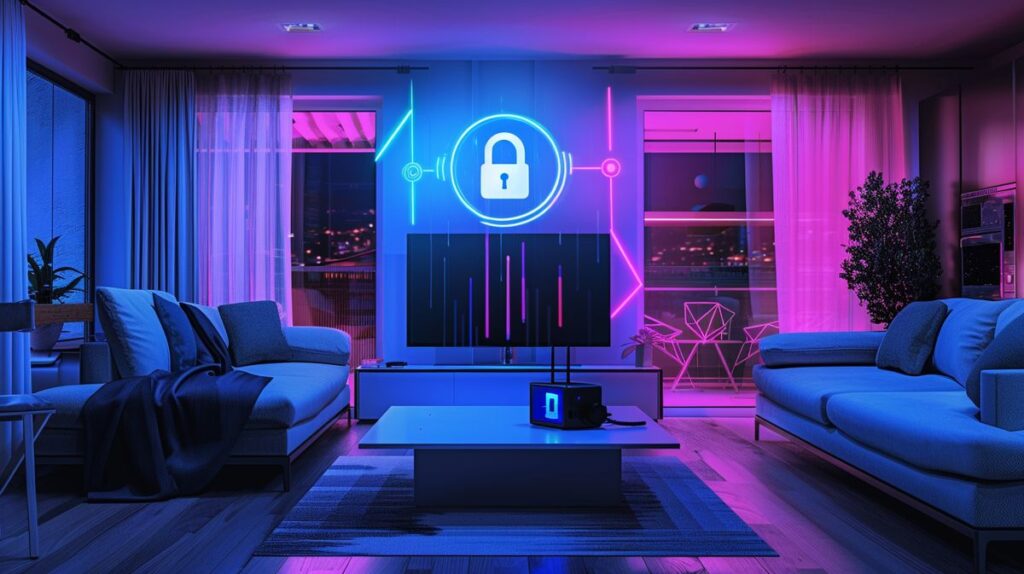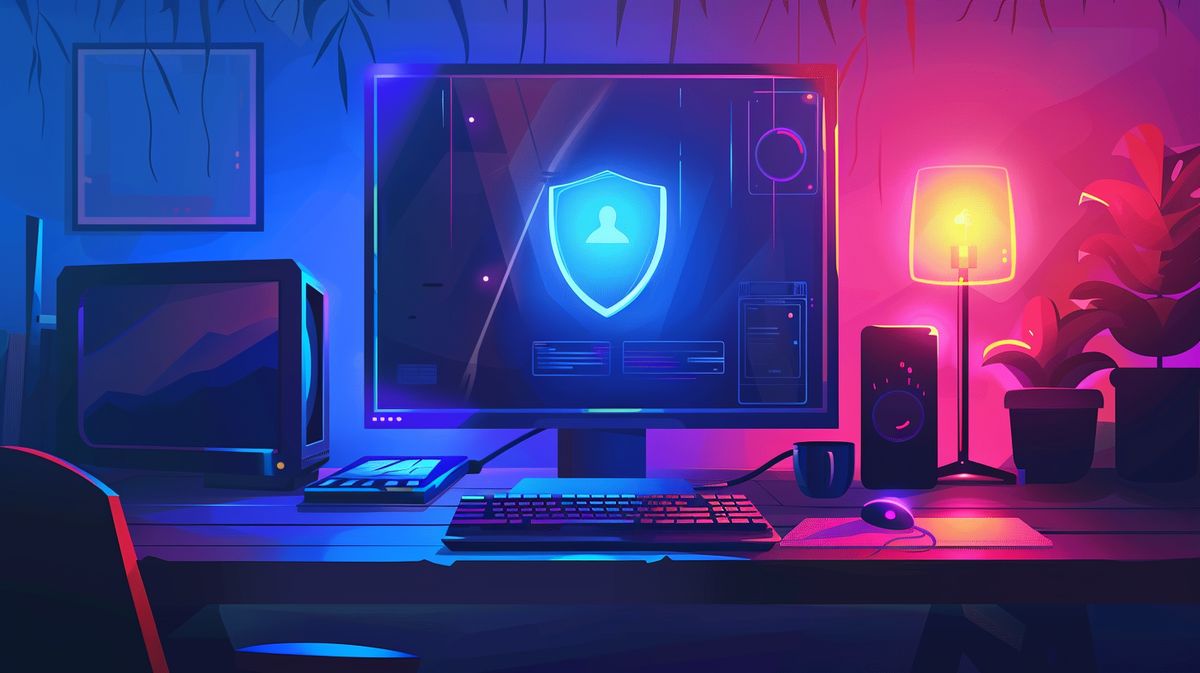Master Guide: How Can You Protect Your Home Computer Cyber Security
Did you know putting your home computer’s cyber security on the backburner could make you a prime target for hackers? If that caught your attention then brace yourself, because the amount of cyber threats out there is staggering and ever-growing. But fear not, as there are security measures you can put in place right now.
This essential guide dives deep into home computer cyber security, delivering practical steps for every homeowner to implement. Get ready to learn effective strategies, from identifying phishing emails to fortifying your WiFi network. Think of it as building an invisible fortress around your digital life.
Remember, the more informed you are, the better your chances of outsmarting any potential threats. So, are you ready to take control and protect your home, privacy, and peace of mind?
How Can You Protect Your Home Computer Cyber Security
Use Common Sense as Your First Line of Defense
Think of unsolicited emails, messages, and phone calls like unexpected guests knocking at your door. Always scrutinize them. You wouldn’t let in a stranger, right? Same principle here—stay alert for anything that seems out of the ordinary.
- Verify the legitimacy of unexpected contacts, especially if they’re asking for personal information or prompting immediate actions. Use known contact details to confirm authenticity.
Be Aware of Common Scams and Phishing Tactics
Scammers are like pickpockets in a bustling market. Familiarize yourself with their tactics so you can spot them before they get to you.
- Understand the different types of scams—phishing (fraudulent emails), vishing (voice phishing), and more. Being aware is your first layer of protection.
- Be cautious with any communication that creates an urgency or requests sensitive information like passwords or credit card numbers. Scammers use panic to trick you.
Learn to Recognize Phishing Emails
Phishing emails often have red flags that are as obvious as a neon sign in the dark. Look out for them.
- Be on the lookout for spelling mistakes, generic greetings (like “Dear User”), and email domains that don’t match the sender’s identity.
- Be suspicious of emails with dodgy links or attachments. Hover over links to see their true destination and verify attachments before opening them.
Avoid Opening Suspicious Attachments or Clicking Unusual Links
Attachments from unknown sources are like uninvited guests—they can bring trouble. Don’t open them.
- Steer clear of email attachments from unknown or untrusted sources. They might contain malware that compromises your computer’s security.
- Avoid clicking on links in unsolicited emails or messages. They could lead you to malicious websites designed to steal your information.
Stay Away from Pirated Material from Untrusted Sources
Downloading pirated content is like eating food from a suspicious vendor—risky. Stick to reputable sources.
- Download software, music, movies, and other files only from legitimate and authorized sources. This reduces the risk of downloading compromised or malicious files.
- Pirated content can be a hotspot for malware and other security threats. By sticking to legitimate sources, you help keep your home computer’s cyber security intact.
Securing Your Home Network
Keeping your home network secure is crucial for protecting all your connected devices and personal information. Here are some essential steps you can take:
Change the Default Admin Password on Your WiFi Router
- First things first – change those default login credentials. A strong, unique password is your first line of defense against unauthorized access.
- Think complex! Use a mix of uppercase and lowercase letters, numbers, and symbols. It’s a small step that goes a long way in fortifying your home network security.
Ensure Your Network Requires a Password
- Opt for WPA3 encryption. It’s the latest and greatest for securing your WiFi. If that’s not available, WPA2 is a solid alternative.
- Your WiFi network’s password should be strong and unique. It’s one of the simplest answers to the question, “How Can You Protect Your Home Computer Cyber Security?” Ensure no freeloaders can piggyback on your network.

Keep Track of All Devices Connected to Your Network
- Make it a habit to regularly review all devices connected to your network. Spotting unfamiliar gadgets can alert you to potential security threats.
- Utilize network management tools. They’re like having a personal security guard for your WiFi – alerting you when new devices connect and making it simple to manage connections.
Secure Your Wi-Fi Network with Encryption and a Strong Password
- Always aim for WPA3 encryption. It’s the best you can get. If it’s not an option, WPA2-AES is your next best bet.
- WEP encryption? Avoid it like the plague. It’s outdated and won’t safeguard your network effectively.
- Remember, consistent application of these steps is crucial. It’s about securing your home network and giving you peace of mind.
This layered approach—deterrence, detection, and defense—is key to answering the question, “How Can You Protect Your Home Computer Cyber Security?” Stay vigilant, stay safe!
How Can You Protect Your Home Computer Cyber Security
In today’s digital age, keeping your home computer secure is paramount. Whether it’s fending off hackers, safeguarding personal information, or shielding your kids from online dangers, understanding the basics of cyber security will go a long way in protecting your digital life. Let’s dive into some practical steps you can take to enhance your home computer’s security.
Protect Devices with Strong PINs or Passcodes and Keep Software Up to Date
- Use a complex PIN or passcode: Think of your passcode as the lock on your front door. A weak lock invites trouble. Make sure all your devices are secured with strong, hard-to-guess passcodes. This is your first line of defense against unauthorized access.
- Regularly update your software: Imagine patching up holes in a fortress wall. Keeping your operating systems and applications up to date patches security vulnerabilities and improves overall device security.
Enable Automatic Updates
- Turn on automatic updates: Think of this as having an automatic lock on your door. Configure your devices to install updates automatically. This helps maintain the latest security patches without manual intervention.
- Install updates promptly: As soon as updates and security patches become available, ensure they are installed to protect against emerging threats. Delaying these is like leaving an unlocked door open.
Use a Firewall to Monitor Network Traffic
- Configure your firewall: Picture your firewall as a vigilant security guard. Set it up to monitor and control both incoming and outgoing network traffic, providing an essential barrier against external threats.
- Utilize both hardware and software firewalls: For maximum protection, use a hardware firewall in conjunction with software firewalls. This dual approach ensures robust defense of your network and devices.
Install and Maintain Reliable Antivirus and Anti-Malware Software
- Choose reputable software: Just as you wouldn’t skimp on a home alarm system, invest in a well-reviewed antivirus program. Keep it regularly updated to stay protected against the latest threats.
- Regular scans: Think of regular scans as routine security inspections. Consistently run full system scans to detect and eliminate any malicious software present on your devices.
Perform Regular System Scans
- Schedule regular scans: Set up a routine schedule for running system scans using your antivirus and anti-malware software. This helps you identify potential threats early, much like regular health check-ups for your devices.
- Address issues immediately: Upon detecting threats, act immediately. Ignoring security warnings is like ignoring smoke from a fire—dangerous and escalating.
Use Separate Computers for Parents and Kids or Ensure Separate Accounts
- Individual user accounts: Create distinct user accounts with appropriate permissions for each family member. This compartmentalizes activities and enhances security, much like having separate keys for different rooms.
- Implement parental controls: Restrict access to specific websites and applications through parental controls. This maintains a safe online environment for children, akin to supervised playgrounds.
Use a VPN to Protect Your Privacy
- Encrypt your connection: Use a VPN (Virtual Private Network) to encrypt your internet connection, especially when using public networks. This safeguards your data from prying eyes, much like tinted windows in your home.
- Choose a reputable VPN service: Select a reliable VPN provider to ensure your privacy and security are maintained at all times. Think of this as choosing a trusted security company.

Perform a Factory Reset Before Disposing of Any Device
- Erase personal data: Before disposing of any device, perform a factory reset to remove personal data. This returns the device to its original state, like wiping a chalkboard clean.
- Use data destruction software: If a factory reset does not completely erase data, consider using specialized data destruction software. Ensure all sensitive information is irretrievable, akin to shredding confidential documents.
Ensure Physical Security and Block Access to USB Ports
- Secure your devices: Keep computers and other devices in secure, access-controlled areas to prevent physical tampering or theft. Think of this as installing locks on your windows.
- Block USB ports: Physically block or disable USB ports to thwart unauthorized access and potential data theft via external storage devices. This is like locking the mailbox to prevent mail theft.
Securing Your Accounts/Passwords
Keeping your home computer secure requires some robust strategies. Let’s dive into practical steps you can take to ensure the security of your accounts and passwords.
Use Long, Complex Passwords
How Can You Protect Your Home Computer Cyber Security? Start with creating long and complex passwords. Think of them as the equivalent of a deadbolt on your digital door. Make sure each password is at least 12 characters long and includes a mix of uppercase letters, lowercase letters, numbers, and symbols. This approach makes it significantly harder for cyber attackers to guess or crack your passwords.
Use Unique Passwords for Each Account and Device
Would you use the same key for your car, house, and office? Of course not! Similarly, avoid using the same password across multiple platforms. Instead, deploy a password manager to securely store and manage your unique passwords. This method lowers the risk of multiple accounts being compromised if one password is leaked.
Use Two-Step or Multi-Factor Authentication
Adding layers of security to your digital presence is crucial. Enable Two-Factor Authentication (2FA) or Multi-Factor Authentication (MFA) wherever you can. Think of it as adding a security system to your already locked door. Use SMS codes, authentication apps, or even biometric verification like fingerprints or facial recognition to fortify your accounts’ security.
Avoid Using Obvious Information in Passwords
Steer clear of using easily guessable information in your passwords. Imagine how easy it is for someone to guess your door code if it’s your birthdate! Similarly, avoid common choices such as birthdays, names, or simple phrases in your passwords. Use random combinations of characters and remember to change your passwords frequently for maximum protection.
Change Passwords Periodically
Regularly updating your passwords is key to maintaining security. By changing passwords periodically, the risk of any potential breaches diminishes. If you ever suspect a password has been compromised, change it immediately. It’s like changing your house locks if you lose a key—better safe than sorry.
How Can You Protect Your Home Computer Cyber Security
Create Regular Backups of All Personal Data
One of the most crucial steps in protecting your home computer cybersecurity is creating regular backups of your important data. This includes documents, photos, and critical files, which should be backed up to external drives or reliable cloud services. Make sure these backups are stored securely and can be easily accessed when needed. Regular backups ensure that you can quickly recover your data in case of a cyber attack, minimizing the impact of the breach.
Change Passwords Immediately if an Account is Hacked
If you discover that one of your accounts has been compromised, take immediate action to change the password for that account. This is a fundamental measure in protecting your home computer cybersecurity. Additionally, it’s crucial to update the passwords for any other accounts using the same or similar credentials to prevent further unauthorized access. Use strong, unique passwords to enhance your security.
Monitor Credit Card Statements and Report Suspicious Charges
Regularly reviewing your bank and credit card statements is essential to identify any suspicious transactions early. This proactive monitoring helps in protecting your home computer cybersecurity by ensuring that any unauthorized charges are quickly detected. If you find any unusual activities, report them to your bank or credit card issuer immediately. Early detection and reporting can help in mitigating the potential damage caused by cyber criminals.
Additional Practices for Protecting Your Home Computer Cyber Security
Educate Family Members About Basic Computer Security Practices
You wouldn’t let your kids leave the front door wide open, right? The same principle applies to your home computer cyber security. Teach your family about bolstering their online defenses. Stress how critical it is to create strong, unique passwords for every account. Help them recognize phishing attempts and understand the dangers of clicking on suspicious links or downloading unknown attachments.
Regularly updating software and enabling multi-factor authentication wherever possible are non-negotiables. Don’t forget about social media – showing everyone how to configure their privacy settings can prevent oversharing, which can be a treasure trove for cybercriminals.
Regularly Monitor Financial Statements and Online Accounts
Think of your financial and online accounts as your digital wallet. Would you carry it around without checking its contents? Regularly reviewing your bank and credit card statements for unauthorized transactions is a must. Catching suspicious activity early can save you from significant financial loss down the line.
Set up real-time alerts to notify you of significant transactions or changes to your accounts. These alerts act as your digital security guard, ready to warn you at the first sign of trouble.
Limit Sharing Personal Information Online
Ever thought about how much personal information you’re sharing online? Less is definitely more here. Avoid posting sensitive details such as your address, phone number, or financial information on social media and public platforms. Cybercriminals are always on the lookout for this information to use in phishing attempts or identity theft.

Adjust your social media privacy settings to control who sees your personal details and posts. Regularly reviewing and updating these settings ensures that only trusted connections have access to your private information.
Review Annual Credit Reports and Consider Freezing Your Credit
Obtaining and reviewing your annual credit reports from major credit bureaus is like performing a health check on your financial state. Spotting anomalies early can prevent long-term damage to your credit score.
Thinking of a credit freeze? It’s a powerful tool to protect against identity theft. By restricting access to your credit report, you make it difficult for identity thieves to open new accounts in your name. This is especially useful if you’re not planning to apply for new credit anytime soon.
How Can You Protect Your Home Computer Cyber Security
Ensuring robust cybersecurity for your home computer involves staying informed on best practices and considering professional support. Here’s how you can fortify your defenses:
Stay Informed on Cybersecurity Best Practices
The digital world evolves quickly. Stay one step ahead by continuously educating yourself on the latest threats and best practices. Think of it as arming yourself with knowledge to create a safer digital environment for your family.
- Continuously educate yourself: Just like you wouldn’t leave your home’s door unlocked, don’t leave your mind unprepared. With new threats emerging every day, it’s essential to stay updated. This knowledge is the backbone of your home computer cybersecurity.
- Follow cybersecurity news sources: Make it a habit to read reputable cybersecurity news. Think of these sources as your daily dose of digital defense, keeping you informed about new threats, vulnerabilities, and protective measures. Subscribing to industry blogs, news websites, and forums can be your secret weapon.
- Attend workshops or webinars: Picture these events as your cybersecurity boot camp. Through workshops, webinars, and online courses, you can deepen your understanding. Expert advice here is like a trusted friend giving you practical tips on safeguarding your local network and devices. For instance, check out our guide on how to disarm your Ring Alarm to ensure your security system is effectively managed.
Consider Professional Consultancy or Managed Cybersecurity Solutions
Sometimes, bolstering your cybersecurity requires professional help. Think of these services as having a security expert on speed dial.
- Seek professional cybersecurity consultancy: Tailored advice can be invaluable. A professional cybersecurity consultant will pinpoint vulnerabilities in your home network, just like a locksmith checking all your doors and windows.
- Managed cybersecurity services: These services are the watchful eyes you need. Providing continuous monitoring and protection, they handle real-time threat detection and response. Managed cybersecurity ensures your home computer’s defenses are always at their best.

Conclusion
Implementing comprehensive cybersecurity measures is paramount in protecting your home computer and online activities. By adopting these practices, you are not only safeguarding your personal data and financial information but also fortifying your digital life against potential threats.
Understanding the importance of utilizing strong, unique passwords and multi-factor authentication is essential. These steps significantly reduce the risk of unauthorized access to your accounts. Similarly, maintaining up-to-date security software and enabling automatic updates help keep your systems protected against the latest vulnerabilities.
Regularly monitoring your financial statements and online accounts allows you to swiftly detect and address any suspicious activities. Educating all family members about basic cybersecurity practices ensures a collective approach to online safety.
Cybersecurity is not a one-time effort but a continuous process. Staying informed about the latest threats and best practices is crucial. Consider professional consultancy and managed cybersecurity solutions for including additional layers of security tailored to your needs.
Ultimately, a proactive and informed approach to cybersecurity can keep your digital life secure and give you peace of mind. Stay vigilant, stay updated, and prioritize your online safety.
By integrating these measures into your daily routine, you effectively answer the question: How Can You Protect Your Home Computer Cyber Security. This continuous effort will help create a safer and more secure digital environment for you and your family.
FAQ: Protecting Your Home Computer Cyber Security
How Can I Protect My Home Computer Cyber Security with a Strong Password?
Ever found yourself wondering how secure your passwords really are? It’s crucial to create passwords that are strong and difficult to crack. Here’s how:
- Mix It Up: Use a combination of uppercase letters, lowercase letters, numbers, and symbols. Imagine it like building a strong wall with different types of bricks.
- Avoid the Obvious: Steer clear of common words, simple sequences, or easily guessable information. Your pet’s name or ‘password123’ just won’t cut it.
- Go Long: Make sure your password is at least 12 characters. Think of it as an extra layer of defense, just like a longer fence is harder to jump over.
- Random is Better: Consider using a random password generator. It’s like having a security expert design your defense system for you.
What Steps Should I Take if My Home Network is Not Secured?
A vulnerable home network is like leaving your front door wide open. Here are immediate steps you can take to bolster your network security:
- Change Default Passwords: First thing, change that default admin password on your WiFi router. It’s like replacing a weak lock with a sturdy one.
- Enable WPA3 Encryption: Activate WPA3 encryption and set a strong, unique network password. It’s akin to installing an upgraded lock system.
- Monitor Your Network: Regularly check the devices connected to your network and disconnect any unknown ones. Think of it as keeping an eye on who’s coming and going from your property.
- Use Management Tools: Use network management tools for better monitoring and security. This is like having a comprehensive surveillance system keeping your digital space secure.
How Often Should I Update My Computer’s Security Software?
Outdated security software is an open door for threats. Keeping your software up-to-date is key. Here’s what you should do:
- Enable Automatic Updates: Set your system to automatically update. This ensures real-time protection without you having to remember.
- Manual Checks: Even with automatic updates, manually check for updates at least once a week. It’s like checking your locks one last time before bed.
- Update All Critical Software: Regularly update all critical software—not just your operating system. Each software update is like fixing potential cracks in a shield.
Is It Necessary to Use a VPN for Home Computer Cyber Security?
Ever felt wary about using public WiFi? A VPN can significantly enhance your home computer’s cyber security by creating a secure tunnel for your data. Here’s why:
- Enhances Privacy: Using a VPN encrypts your internet connection, offering better privacy and security. It’s like having soundproof walls for your confidential conversations.
- Especially on Public WiFi: On public networks, a VPN makes it hard for hackers to intercept your data. Think of it as having an undercover security guard with you at all times.
- Choose Reputable Services: Opt for a reputable VPN service for more reliable protection. Just like you wouldn’t trust your home security to a questionable company, don’t skimp on quality here.
What Should I Do When My Online Account is Hacked?
Finding out that your online account has been hacked can be alarming. Immediate action is essential:
- Change the Password: First, change the compromised account’s password. It’s like changing your home locks right after a break-in.
- Enable Two-Factor Authentication: Add an extra layer of security by enabling two-factor authentication. Think of it as adding a second lock to your door.
- Monitor the Account: Keep a close watch on the account for unusual activities and notify the service provider. It’s like watching for any signs of an intruder returning.
- Inform Contacts: Let your contacts know about the potential breach to prevent further damage. It’s like warning your neighbors after spotting suspicious activity around.
I’m James Albright, a home security expert with over 15 years of experience, and I’m passionate about helping families protect what matters most. After serving as a police officer, I transitioned to security consulting to share my hands-on knowledge and practical tips. My mission is to make home security simple and reliable by offering clear, no-nonsense advice and easy-to-follow guides. When I’m not reviewing the latest security tech or writing, I’m out in the community leading neighborhood watch programs and, most importantly, keeping my own family safe.





Post Comment